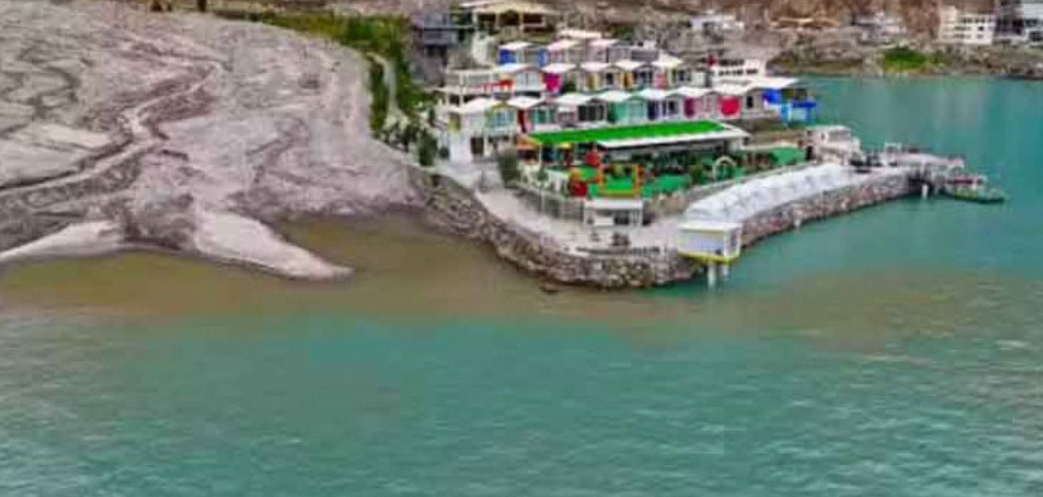
Hotel Fined for Rs1.5 Million for ‘Dumping’ Sewage into Attabad Lake
A hotel located near the scenic Attabad Lake in Gilgit-Baltistan has been fined Rs1.5 million by environmental authorities for illegally discharging untreated sewage into the lake. The punitive action has sparked renewed concerns about the environmental degradation of one of Pakistan’s most popular tourist destinations. Authorities and environmental activists have raised alarms over the impact of such practices on water quality, aquatic life, and the broader ecosystem of the region.
Violation and Fine Imposed
According to officials from the Gilgit-Baltistan Environmental Protection Agency (GB-EPA), the hotel was found guilty of violating environmental protection laws by allowing untreated waste and sewage to flow directly into the pristine waters of Attabad Lake. During a routine inspection, enforcement teams discovered pipelines concealed behind the hotel that were releasing contaminated water into the lake.
Upon verification, the hotel management failed to produce any valid documentation for a proper sewage treatment system or compliance certification. The agency subsequently issued a notice and, after completing the required legal proceedings, imposed a fine of Rs1.5 million as a penalty for the environmental violation. The hotel has also been directed to halt all sewage dumping activities immediately and to install an approved sewage treatment facility.
Impact on Attabad Lake
Attabad Lake, formed in 2010 following a massive landslide in the Hunza Valley, has since become a major tourist attraction due to its turquoise waters and dramatic mountainous surroundings. It serves as a source of livelihood for local communities through tourism and fishing. However, the dumping of sewage and waste threatens to contaminate the lake’s ecosystem.
Experts warn that untreated sewage introduces harmful bacteria, nutrients, and chemicals into the water. This not only pollutes the lake but also affects aquatic species, increases the risk of waterborne diseases, and diminishes the quality of water used for recreation and local consumption. If left unchecked, such practices can permanently damage the lake’s natural beauty and ecological balance.
Response from Environmental Authorities
The GB-EPA has taken a strong stance on the issue, stressing that the preservation of natural resources in Gilgit-Baltistan is a top priority. Officials confirmed that monitoring teams have been deployed to inspect other hotels, guesthouses, and commercial establishments around the lake and surrounding areas to ensure compliance with environmental regulations.
The agency has also warned that similar action will be taken against any other entity found to be polluting the region’s lakes, rivers, or environment. Enforcement teams are working in coordination with the local administration and tourism department to implement stricter controls and encourage sustainable tourism practices.
Reactions from Local Community and Environmentalists
The news of the fine has drawn mixed reactions from the local community. Many residents and small business owners welcomed the action, citing the urgent need to protect the region’s natural resources, which are critical for both ecological health and the tourism-based economy. Others expressed concern that some hotels may continue such activities covertly, urging authorities to establish permanent monitoring mechanisms.
Environmental groups and activists have also praised the penalty as a necessary deterrent. They have called for broader policy reforms, including mandatory environmental impact assessments for all hospitality businesses operating in ecologically sensitive areas. Public awareness campaigns have also been recommended to educate business owners and tourists about the importance of environmental conservation.
Call for Sustainable Tourism Practices
The incident has reignited the debate on the need for sustainable tourism in Gilgit-Baltistan. While tourism is a vital source of income for the region, unchecked expansion without proper waste management infrastructure poses serious environmental risks. Experts suggest that hotels and resorts must be required to install on-site sewage treatment plants and comply with waste disposal protocols as part of their licensing process.
Moreover, the introduction of eco-certification for hotels and stricter regulatory frameworks can encourage businesses to adopt responsible practices. Training programs for hotel staff, clear guidelines for waste management, and active involvement of local communities in environmental monitoring can collectively ensure that tourism development does not come at the cost of environmental degradation.







